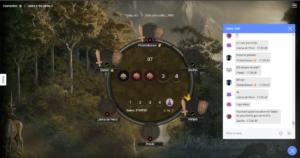
screenshot of the team formation during Avalon game. I wish I could grab more screenshots, but when I went back to the game to get some more, no one was in the lobby…
For this first critical play assignment I played Avalon, which was designed by Don Eskridge and adapted to be an online browser game (avalon.fun). I had previously heard of Avalon but had never had the opportunity to play it before, so I thought this assignment would be the perfect time!
The official board game has a suggested age range of 13+. This game appears to be made for people who want a social game with more of a fantasy element.
There can be anywhere between 5-10 people playing the game. There is a chart which informs the user how many players will be on each team. In the online version, you have the option to add a number of special characters. The only character added by default with special powers is Merlin. However, in setup, you can add Mordred, Morgana and Pervival, or Oberon. Each of these additional characters can shift the game’s balance to favor good or evil. Also in setup, you can set voting to be public or private. In all the games I played it was public.
The most similar game I’ve played to Avalon is Secret Hitler. In fact, I would describe Avalon as a more convoluted Secret Hitler. One distinguishing element of Avalon is the increased number of roles players can take on with secret powers. But the primary difference between these games is the size of the party that will quest or decide legislation. In Secret Hitler, the chancellor picks a president, who is the sole picker of the legislation option they receive. However, in Avalon, a team must be put together to quest, and this team must be composed entirely of good guys for the quest to succeed. In Secret Hitler, there is a consequence for continually voting down new presidents, but in Avalon there is no downside, so teams are voted down very frequently. Because of this mechanic, players are more intentional about how they vote, and observing who votes for who, which I enjoyed. In games I played, people were VERY suspicious about voting behavior.
The required team size to have a successful quest also increases as the game continues, so you cannot just send the same team over and over.
It is difficult for me to determine which game between Secret Hitler and Avalon I like more. I think I’ve enjoyed games of Secret Hitler more, but that is likely because those games were played in person and with people I knew. I enjoyed the mechanics and added twists of Avalon, and I believe, if played with the right crowd, it would be more fun than Secret Hitler.
Unfortunately, it was quite difficult to get into a game, and I needed to enlist some of my friends to reliably get into a game. I did enjoy bantering with people in the online lobby who kept kicking me out of the game. Unfortunately, the first time I played, there was only one lobby running, and all the players seemed to be friends in real life. So whenever I joined, I got kicked out. However, I had fun (and I think the other players had fun) joking about it.
Playing Avalon was fun, though. I felt there was good balance between the roles, and they led to very interesting interactions that I didn’t see coming at all.
In one game I played, my fellow good guys and I were so turned around about who Merlin was (the good guy who knows who the bad guys are), that we just trusted a bad guy giving cryptic (and entirely incorrect information) about who was who in the game. Needless to say, we were destroyed in that game.
In order to improve the game, I would play with less special characters. Maybe because I was new to the game, I found a lot of the roles confusing, and muddied the waters a little too much. They also slowed down the game. There is an option to remove special characters, but in all of the online games I played, special characters were turned on.


